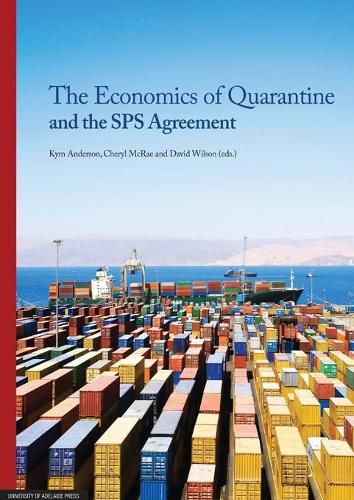Readings Newsletter
Become a Readings Member to make your shopping experience even easier.
Sign in or sign up for free!
You’re not far away from qualifying for FREE standard shipping within Australia
You’ve qualified for FREE standard shipping within Australia
The cart is loading…






This title is printed to order. This book may have been self-published. If so, we cannot guarantee the quality of the content. In the main most books will have gone through the editing process however some may not. We therefore suggest that you be aware of this before ordering this book. If in doubt check either the author or publisher’s details as we are unable to accept any returns unless they are faulty. Please contact us if you have any questions.
The Uruguay Round of multilateral trade negotiations, culminating in the GATT Secretariat being transformed into the World Trade Organization (WTO) on 1 January 1995, has altered forever the process of quarantine policymaking by national governments.
On the one hand, WTO member countries retain the right to protect the life and health of their people, plants and animals from the risks of hazards such as pests and diseases arising from the importation of goods. On the other hand, the WTO’s Agreement on Sanitary and Phytosanitary Measures (the SPS Agreement) requires that quarantine measures be determined in a manner that is transparent, consistent, scientifically based, and the least trade-restrictive.
This collection resulted from an international workshop funded and organised by Biosecurity Australia, the agency of government responsible for analysing Australia’s quarantine import risks and for negotiating multilateral SPS rules and less restrictive access to overseas markets for Australian produce. The workshop, which was held at the Melbourne Business School on 24-25 October 2000, brought together a distinguished group of applied economists and quarantine policy analysts whose focus involves regions as disparate as Europe, North America, Africa, Asia and New Zealand, in addition to Australia.
$9.00 standard shipping within Australia
FREE standard shipping within Australia for orders over $100.00
Express & International shipping calculated at checkout
This title is printed to order. This book may have been self-published. If so, we cannot guarantee the quality of the content. In the main most books will have gone through the editing process however some may not. We therefore suggest that you be aware of this before ordering this book. If in doubt check either the author or publisher’s details as we are unable to accept any returns unless they are faulty. Please contact us if you have any questions.
The Uruguay Round of multilateral trade negotiations, culminating in the GATT Secretariat being transformed into the World Trade Organization (WTO) on 1 January 1995, has altered forever the process of quarantine policymaking by national governments.
On the one hand, WTO member countries retain the right to protect the life and health of their people, plants and animals from the risks of hazards such as pests and diseases arising from the importation of goods. On the other hand, the WTO’s Agreement on Sanitary and Phytosanitary Measures (the SPS Agreement) requires that quarantine measures be determined in a manner that is transparent, consistent, scientifically based, and the least trade-restrictive.
This collection resulted from an international workshop funded and organised by Biosecurity Australia, the agency of government responsible for analysing Australia’s quarantine import risks and for negotiating multilateral SPS rules and less restrictive access to overseas markets for Australian produce. The workshop, which was held at the Melbourne Business School on 24-25 October 2000, brought together a distinguished group of applied economists and quarantine policy analysts whose focus involves regions as disparate as Europe, North America, Africa, Asia and New Zealand, in addition to Australia.